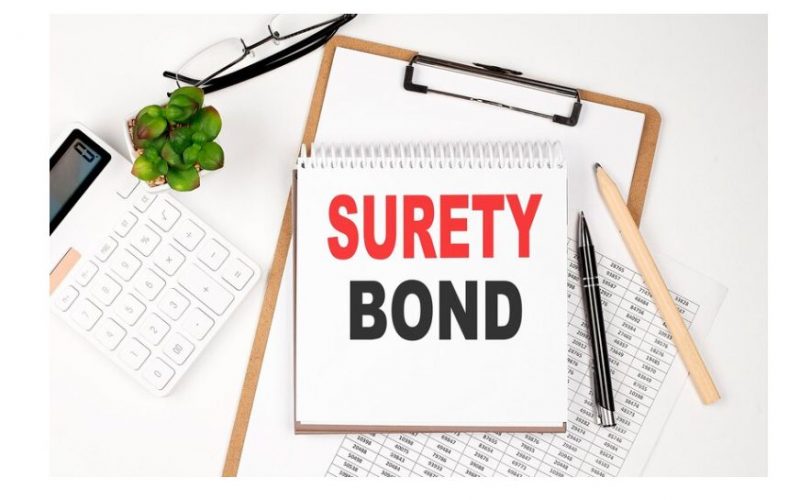What Is Surety?
A surety is someone or an entity (surety bond companies)that agrees to pay the debt in the event that the debtor defaults or cannot make the payments. The surety or guarantor is the person or entity that guarantees the debt.
Furthermore, the payment made to the surety company is paying for the bond, but the principal is still liable for the debt. It is most common in contracts in which one party questions whether the counterparty will be able to fulfill all requirements. The guarantor may enter into a contract of suretyship to reduce risk and lower interest rates for the borrower.
Note that:
- A surety is a person or entity that assumes liability for another party’s debt, default, or other financial obligations.
- When one party’s financial standing or well-being is in doubt and the other party requests a guarantor, a surety is frequently used in the contract.
- Financial instruments known as surety bonds bind the principal, the obligee—often a government agency—and the surety.
- With surety bonds, the surety offers the principal a line of credit to guarantee the obligee that the principal will carry out their end of the bargain.
That being said this guide aims at providing the right information about surety bonds and the best companies to trade with, in 2023.
What Is A Surety Bond?
A surety bond is a three-party, legally-binding agreement between the principal, the obligee, and the surety. The principal, typically a business owner or contractor, is required to obtain a surety bond as a guarantee against future work performance by the obligee, which is typically a government agency.
Additionally, if the principal fails to fulfill their obligations, the obligee has the right to file a claim against the bond to recover any damages or losses incurred. Note that the surety company will pay reparation that cannot exceed the bond amount, and the underwriters will expect the principal to reimburse them for any claims paid.
How Do Surety Bonds Work?
Surety bonds are complex, but most have similar components and features. To understand how they work, it is important to know who is involved and understand the elements of each bond.
#1. Principal:
The person or company that obtains a bond from a surety to ensure their capacity to fulfill obligations to a third party, the obligee, is known as the principal.
#2. Obligee:
The party requesting the principal’s bond is known as the obligee. Bonds are necessary for obligation holders to reduce their risk and financial loss if the principal fails to fulfill its obligations. In the case of a claim against the principal, the surety pays the obligees.
#3. Surety:
The company that underwrites the bond to financially support the principal is known as the surety. The surety will cover any claims made by the obligee if the principal is unable to fulfill its obligations.
Additionally. principals and sureties must agree on certain elements of a bond agreement, such as the bonded amount, working capital, bonding capacity, bond premium, and bond term.
#4. Bonding capacity:
A principal’s bonding capacity, which is usually determined by the principal’s financial situation, track record, and reputation, is the maximum amount of insurance that can be provided by a surety. Furthermore, businesses with higher reliability ratings from sureties will probably be able to obtain larger capacities. A principal’s capacity can be set for either a specific job or as an overall cap for all of their projects.
#5. Working capital:
Before approving a bond, surety companies will consider several factors, including working capital, which is determined by subtracting a company’s current assets from its current liabilities. Note that sureties want to know what kind of financial cushion a business has to pay its debts because they will need reimbursement from the principal in the event of a claim.
#6. Premium:
The cost of a surety bond is determined as a percentage of the bond’s value. Additionally, the rate is determined by some variables, including your or your company’s credit history, the likelihood of a loss or other risks, and the balance sheet and other financial statements of your company.
#7. Terms:
The terms of a surety bond refer to how long the bond is valid. Note that the principal will stop paying a premium once the term is over, and the surety will no longer assume the bond’s risk.
What Are the 4 Types of Surety Bonds?
#1. Contract Surety Bonds:
The obligation to enter into a contract with the principal is encouraged by a contract surety bond. In the construction sector, contract surety bonds are frequently used and come in various forms:
- Bid bonds assure that a contractor who submits a bid will sign a contract if it is approved.
- The contractor’s compliance with the terms of the construction contract is ensured by performance bonds.
- Contractual obligations to pay subcontractors are ensured by payment bonds. Additionally, subcontractors might need to get bonded.
- Supply bonds assure that the contractor will pay the material suppliers.
- Maintenance bonds assure that, after construction is complete, the contractor will meet all maintenance and repair obligations.
- Municipalities frequently demand improvement bonds, also called subdivision bonds, for the development of subdivisions.
#2. Judicial Surety Bonds:
A variety of circumstances involving court proceedings call for the use of judicial bonds, also known as court bonds. Note that bail bonds are used in criminal cases to guarantee the defendant’s appearance at the trial or other subsequent proceedings.
Additionally, there are various categories of judicial bonds for civil cases, including:
- The party that prevailed in the initial proceeding is protected by appeal bonds, also known as supersedeas bonds, from damages resulting from a delay brought on by an appeal by the losing candidate.
- Mechanic’s lien bonds, which shield a defendant from financial loss brought on by a mechanic’s lien.
- Bonds that indemnify a defendant against losses caused by a property attachment.
- Injunction bonds, which shield a defendant from losses brought on by an injunction.
#3. Probate Court Surety Bonds:
In a probate proceeding, anyone appointed as a trustee, guardian, executor, or administrator owes a special duty to carry out their responsibilities honestly, loyally, and in good faith. It’s known as a fiduciary duty.
Additionally, a probate surety bond, also called a fiduciary bond, assures that an estate’s trustee, guardian, executor, or administrator will fulfill their fiduciary obligations to the beneficiaries adequately.
#4. Commercial Surety Bonds:
Any bond that does not fit into one of the other categories falls under the general heading of “commercial surety bond.” Governments frequently demand license and permit bonds before issuing any kind of license or permit. Public officials might be required to post bonds. Business service bonds are used to shield clients or customers from the actions of the company’s employees. For instance, a company that offers office cleaning services might obtain a bond to guard against employee theft or property damage.
Different circumstances may call for the use of additional surety bond types. For instance, surety bonds may be used to prove lost securities and promissory notes or to ensure a company’s self-insurance for workers’ compensation claims or fringe benefits. A surety bond might also be required of a tenant in a commercial lease.
How To Obtain A Surety Bond
Obtaining a surety bond involves a background check, a credit report, and financial information. The bond amount and premium are determined by the creditworthiness of the principal, the type of bond, and the nature of the business. Additionally, some bonds may be guaranteed by the U.S. Small Business Administration, which may result in an additional fee.
However, other bonds are mandated by law, while some are spelled out in the contract. No matter what kind of bond is required, a surety bond is almost always purchased from a reputable bonding business.
Therefore, you’ll be more ready if you require the protection a surety bond offers if you are familiar with the various kinds of surety bonds that are available. Lastly, to learn more about the specific rights of the principal, obligee, and surety, you might want to speak with an attorney.
Best Surety Bond Companies in 2023
#1. The Hartford:
Hartford is the sixth largest surety provider in the U.S., offering a bonding capacity of up to $1 billion on both commercial and contract bonds. Its website allows users to quickly find surety bond agents in their area who partner with The Hartford. Additionally, Hartford has an A+ rating from the Better Business Bureau and scores from the major credit agencies, and its claims reporting tools make it straightforward to report claims by phone or online.
Furthermore, Hartford has a collaborative approach with bond underwriters, claims professionals and legal professionals to investigate and resolve claims fairly.
#2. Travelers:
Travelers is a major player in the surety market, providing a wide variety of commercial and contract bonds across different industries. It has the highest bonding capacity of any surety in the marketplace and has a long history in the market for small contractors. Therefore, they recommend finding an independent surety agent near you to obtain information about their offerings.
Furthermore, Travelers’ financial strength ratings are among the highest of any surety, and their financial strength ratings are among the highest of any surety. Travelers is a well-respected business with high ratings from AM Best, Standard & Poor’s, Moody’s, and the Better Business Bureau. It offers claims reporting 24/7 by email, fax, phone, or standard mail, and has a team of claims professionals to investigate and resolve claims.
Lastly, they offer risk management services and dispute resolution services to quickly resolve issues with an obligee or subcontractor.
#3. Liberty Mutual:
With a wide selection of commercial, contract, court, and other bonds, Liberty Mutual is a reliable choice for companies looking for surety bonds. Through its Vista program, it also provides conventional surety bonds as well as alternative designs for start-ups and struggling companies. Furthermore, it is one of the biggest surety bond writers on the market and a leader in the surety bond sector.
Additionally, it has three A ratings: an A rating from Standard & Poor’s, and an A rating from Moody’s. Being able to submit a surety claim via an online form, phone, email, or fax makes it fairly simple. It is also true that the best surety bonds are also available for companies with poor credit or other financial difficulties.
#4. Surety Bonds Direct:
The best overall surety bond provider is Surety Bonds Direct, which offers access to a variety of surety bonds across the nation, a best-price hunting model, and a completed surety bond in your hands as soon as the same day you apply.
Additionally, they provide 150 different kinds of bonds, including those for mortgage brokers, freight brokers, contractors, and auto dealers. The type of bond, the state where the bond is required, and the applicant’s credit standing all affect the bond’s price and term. Note that the costs and duration can vary, with costs corresponding to 1% to 12% of the bond’s value. Lastly, the business only focuses on surety bonds, unlike other agencies that also provide a range of insurance products.
#5. MG Surety Bonds:
MG Surety Bonds offers one of the best construction bonds due to their experience with these intricate products. Additionally, they offer various surety options with different costs and terms depending on the contractor’s credit report, trade, rate, amount of surety, and length of time needed.
For example, using Class B General Construction, a 12-month duration, and a $3 million bond, the premium would add up to $28,500 if the contractor needed to extend it an additional three months. Note that they are brokers and only offer surety bonds.
#6. Bryant Surety Bonds:
Bryant Surety Bonds offers one of the best contract bonds due to their nationwide presence, lower rates, and access to specialty programs. Additionally, they offer a 24-hour turnaround time and have a bad credit surety bond program available for commercial bonds. The cost of the contract bond depends on the type of surety bond, the risk associated with it, and the applicant’s credit history and business background. Note that for a credit score above 650, plan on a premium costing between 1% and 3% of the required bond amount.
#7. Gallagher:
Due to its extensive experience across the globe, connections with all significant surety companies, and internal underwriting expertise, Gallagher is the market leader for commercial bonds. Additionally, thanks to their internal underwriting expertise and connections to the most reputable surety companies in the world, they can offer their clients smart and efficient programs.
Furthermore, their commercial bonds include bonding for courts, public officials, licenses and permits, and customs. The state that requires the bond, the type of bond, the industry, the size of the bond amount, and the company’s credit history all affect the price and terms of the bond. Note that, as a broker, Gallagher works by giving principals a single point of contact while searching the market for the best-fitting, least expensive surety products.
#8. Jet Insurance Company:
Jet Insurance Company is licensed in 41 states and offers a variety of license, probate, and permit bonds. Due to its direct distribution model, which offers a monthly payment option, the principal will incur lower surety costs. Additionally, it has a long-term issuer credit rating of BB+ and a financial strength rating of B++. Strong balance sheet strength and a high level of risk-adjusted capitalization are characteristics of Jet Insurance Company, according to Best’s Capital Adequacy Ratio (BCAR).
Furthermore, from bond purchases to bond claims, Jet works directly with the customer, and it is creating a streamlined procedure to handle even the smallest bond claims. Jet is one of the best surety companies because of its platform’s focus on small and emerging companies and its ability to best address a contractor’s necessary license, registration, and permit bonds. for small businesses.
How Much Does a $10 000 Surety Bond Cost in Texas?
Both newbies and seasoned notaries must acquire a notary surety bond to guarantee the security of their clients. Additionally, your state determines how much your surety bond will cost and how much surety bond companies carry out their transactions. The cost of a $10,000 Texas notary bond is only $50 for a four-year term.
What Credit Score Is Needed for Surety Bond?
In a perfect world, surety bond companies would want to see credit scores above 670 as well as no collections, liens, or judgments. Generally speaking, it’s okay if your credit score is below 670; you’ll probably just have to pay more for your bond.
How Do I Get a Surety Bond in Michigan?
Find insurance companies and agencies that promote surety and fidelity coverage. You may find the product you need at a competitive price from companies that actively advertise surety & fidelity bond coverage, even though other insurers and insurance agencies that don’t advertise may be authorized to write surety coverage.
You might be able to locate producers (agents) who represent insurers that can offer the coverage you need with the assistance of representatives from the Michigan Association of Insurance Agents (MAIA).
If you need to file the bond with a company, general contractor, government agency, or county clerk, give them a call. A list of three to five surety insurers’ phone numbers that write bonds for businesses or occupations like yours can be obtained by asking them.
Can You Be Bondable With Bad Credit?
Bad credit may still be acceptable for bonding because the company backing your policy will also take into account other aspects of your application, such as your payment history and previous bonding experience.
How Much Collateral Is Needed for a Bond?
You can meet the requirement for collateral by having a savings account or certificate of deposit that is clearly and adequately assigned to you. A different option is stocks and bonds. Note that real property is eligible to be used as collateral if it is free and clear of any liens or loans.
What Are the Most Common Surety Bonds?
Bid bonds, performance bonds, and payment bonds are the three most distinct categories of contract surety bonds.
#1. Bid bond:
If a contractor’s bid for a project is approved by the obligee, bid bonds mandate that they enter into a contract. The difference between the contractor’s winning bid and the next lowest bid will be paid to the project owner if they decide to terminate their services after being awarded the contract.
#2. Performance bonds:
Project owners are covered by performance bonds in the event that a contractor doesn’t carry out their obligations under the terms of the contract.
#3. Payment bonds:
This guarantees that contractors will be the ones to pay equipment suppliers, other parties whose products or services were used to complete the project, and subcontractors.
What is the Best Surety Bond Company for Freight Broker
JW Surety Bonds, one of the biggest surety bond companies in the US, gives freight brokers a simple way to get a BMC-84 surety bond. To find out what rates you can expect based on your current credit score, apply online via their website and receive a free quote in a matter of minutes. Additionally, JW Surety Bonds provides a team of experts to help fight false claims, along with a 100% money-back guarantee in the event that your bond is not accepted.
The Best Surety Bond Companies in Texas
The businesses listed below are known to provide surety bonds in Texas:
#1. Surety Bonds of Texas – For more than 30 years, this business has offered surety bond services in Texas. In addition to contract bonds, commercial bonds, and court bonds, they provide a wide variety of surety bond products.
#2. Liberty Mutual Surety – Liberty Mutual is a renowned insurer that additionally offers surety bond services. They provide a variety of bond products, such as contract bonds, commercial bonds, and fidelity bonds, and have a solid financial rating.
#3. The Hanover Insurance Group – This is another one of the few reputable surety bond companies that provide surety bonds in Texas is The Hanover. They offer a variety of bond products, such as commercial bonds, license and permit bonds, contract bonds, and others.
#4. BondExchange – BondExchange is a marketplace for surety bonds that links clients with Texas’s best bond companies. They provide a variety of bond products, such as fidelity bonds, commercial bonds, and construction bonds.
#5. Old Republic Surety Company: Old Republic has been a national provider of surety bonds for more than a century. They offer a variety of bond products, such as court bonds, contract bonds, and commercial bonds.
Note that it’s crucial to take the company’s standing, financial stability, and selection of bond products into account when selecting a surety bond provider in Texas. Finally, to find the best deal, it’s also a good idea to compare prices and charges from different providers.
The Best Surety Bond Companies in DC
Some of Washington, DC’s top surety bond companies are listed below:
#1. Colonial Surety Company – A national surety bond provider, Colonial Surety Company provides a variety of bond products, such as contract bonds, commercial bonds, and court bonds. Additionally, they provide affordable prices and have an A+ rating with the Better Business Bureau.
#2. Surety Solutions – Surety Solutions is a surety bond company that focuses on offering bonds to individuals and small businesses. Additionally, they provide a variety of bond products, such as notary bonds, court bonds, and license and permit bonds.
#3. AIA Surety – An international provider of surety bonds, AIA Surety offers a variety of bond products, such as court bonds, commercial bonds, and contract bonds. Additionally, they provide affordable prices and have an A+ rating with the Better Business Bureau.
#4. The Hartford – Hartford is an insurance firm that additionally offers services for surety bonds. They offer a variety of bond products, such as court bonds, contract bonds, and commercial bonds. Additionally, they provide exceptional customer service and have an A+ rating with the Better Business Bureau.
#5. JW Surety Bonds – JW Surety Bonds is a surety bond company that focuses on offering bonds to individuals and small businesses. They provide a variety of bond products, such as court bonds, license and permit bonds, and bonding for contracts. Additionally, they provide affordable prices and have an A+ rating with the Better Business Bureau.
Note that when selecting a surety bond company in Washington, DC, look at the company’s track record, financial stability, and selection of bond products to get the best deal.
WHAT IS BONDING INSURANCE: Understanding Bond Insurance & Why It Is Needed
Cleaning Business Insurance: Best Cleaning Business Insurance and Bonding Options
How to Buy Government Bonds in the US (Updated)






